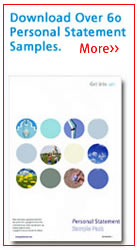Postgraduate Writing Guide
Approaching The Questions
Every postgraduate application will differ, dependent upon the questions in the form. It is important to remember that every personal statement should be to the point and not an autobiography. Focus on your results from the questionnaire, and be particular about each element that you wish to include. If you are lacking practical experience, demonstrate your interest to study. Below is our recommended approach to answering postgraduate application questions.
Introduction
Giving your personal statement a strong opening will engage the reader's attention from the outset. Common mistakes include the use of clichéd and overused sentences in the introduction. For example, you should avoid starting your sentence with the following:
“ I have always wanted to study”.
“ My passion has always been for this subject”.
Below is an example of a powerful introduction:
“Whenever I have set a goal in life, my mind has always drifted to the example set by Lester Wunderman. Growing up poor amidst the Great Depression, he went on to become a marketing mastermind, responsible for innovative direct media techniques such as the insert card and 'Gold Box'. Wunderman was never content to accept setbacks. When faced with a struggle, I have always sought to emulate him by emerging from obstacles - not with a sense of defeat - but with a renewed sense of determination and greater problem-solving skills”.
Notice how the student has used Lester Wunderman as a business icon to introduce their character.
The Body
People often forget about the body. It is important to remember that your personal statement must proceed in a logical succession from one thought to the next. The body of the personal statement should lead in a convincing way from the introduction to conclusion. The paragraphing can be used as a planning tool. The beginning of each paragraph should introduce the topic and the paragraph must end in a "hook" to the next paragraph. Whenever possible give the first sentence an interesting angle.
Each paragraph should follow this general structure.
Make sure your sentence is supported by actions.
1. Specific detail (action that supports the point.)
2. Specific detail (action that supports the point.)
3. Specific detail (action that supports the point.)
The Conclusion
Conclude the personal statement with an attention-grabbing sentence. You may find it helpful to reflect on your main accomplishments and experience. The main point of the conclusion is to underline your desire to study. Read the sample conclusion below.
“In pursuing a post graduate degree in engineering, I seek to advance my research of electrical systems and perfect my personal engineering skills. I have established the strong academic foundation necessary for success, excelling in my engineering degree. Through my intensive work, hands-on work experience, and prolonged personal interest, I have demonstrated my considerable commitment to engineering”.
Having reached the conclusion, admissions officers need to feel that they know more about you than when they started.
The fact that you have been swimming every day is impressive, but what is more interesting is the inspiration behind it: the fact that you had met Olympic winner Duncan Goodhew, and why he inspired you.
Remember to keep the discussion personal. How much you revel about yourself is up to you. Many students fall into the trap of keeping the reader at arms length.
Next: What To Write?
Note: This guide is not intended to replace the advice of tutors, admissions officers, or teachers; Get Into Uni simply provides advice and exercises to help you write a compelling personal statement.





